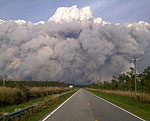EPA Science Wednesday: EPA Study Shows Health Hazards Associated with Peat Wildfire Smoke
 Each week we write about the science behind environmental protection. Previous Science Wednesdays.
Each week we write about the science behind environmental protection. Previous Science Wednesdays.
By Sarah Blau
A few weeks ago my eyes wouldn’t stop itching. That intense, burning itch you know you shouldn’t scratch, but eventually you do. My irritated eyes were telling me that something was wrong, that some foreign species was polluting the air I breathe and my body did not like it.
The source of this relentless itch I discovered from the news on the drive home—wildfires! Wildfire smoke, to be more exact, wafting some 200 miles from the North Carolina coast where peat fires have been smoldering since early May.
As it turns out, I had only one minor symptom of something that can actually cause serious health problems.
In fact, I recently learned that a team of scientists led by EPA investigated the cardiovascular health effects of a similar eastern NC peat fire in 2008. A paper describing the results of this study was published Monday by Environmental Health Perspectives.
Researchers collected emergency room (ER) records from counties directly affected by the 2008 fire’s smoke plume and compared those records to ER records from smoke-free neighboring counties. Research statistics show that the smoke affected counties had an increase in ER visits by 65% for asthma, 59% for pneumonia and bronchitis, and 37% for symptoms of heart failure.

Photo courtesy US Fish and Wildlife Service
Peat fires differ from western canopy wildfires in both the way they burn and the chemical composition of their smoke. This is the first known study to show that exposure to a peat fire can cause both respiratory and cardiovascular effects, and the first study to conclusively show associations between a wildfire and emergency department visits for heart failure symptoms.
Wildfires are inevitable, but we are not completely helpless to suffer their mal-effects. EPA’s AIRNow website is an excellent source for information on both the air quality in your region, and how to protect yourself from the hazard of wildfire smoke.
Whether it’s severe cardiovascular illness or minor allergy-type symptoms, research by EPA and others has shown that wildfire smoke can have harmful health effects. Keep yourself informed of your local air quality and when conditions are poor, take appropriate actions. Maybe if I had taken a shorter morning walk outside with my dog, I wouldn’t have had itchy eyes all day!
About the author: Sarah Blau is a student services contractor working with EPA’s Science Communication Team.
Editor’s Note: The opinions expressed in Greenversations are those of the author. They do not reflect EPA policy, endorsement, or action, and EPA does not verify the accuracy or science of the contents of the blog.

Jun 29, 2011 @ 11:44:48
That Is Burning Our History !!!
Peat forests formed millions years ago together with another species and geology. They developed wild, arranged and controlling of the earth. The Ancestor lived, conflicted, journeyed and celebrated of their life together with them. These are our history in the thick-books. But after that, climate are changing when the planets-revolution attacks its-self. Panics everywhere, conflicts anywhere and the disasters anytime. We need the environmentalists to solve these problems and let’s they should improve brilliant histories for the future….